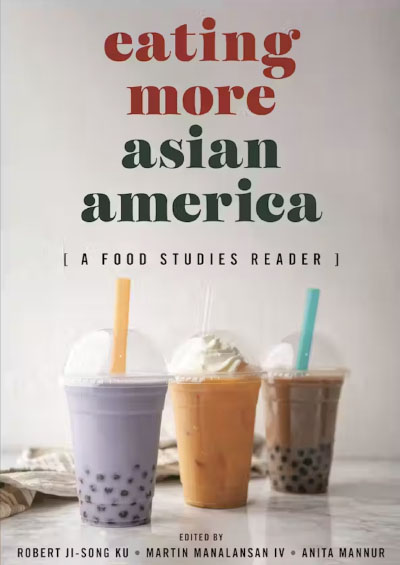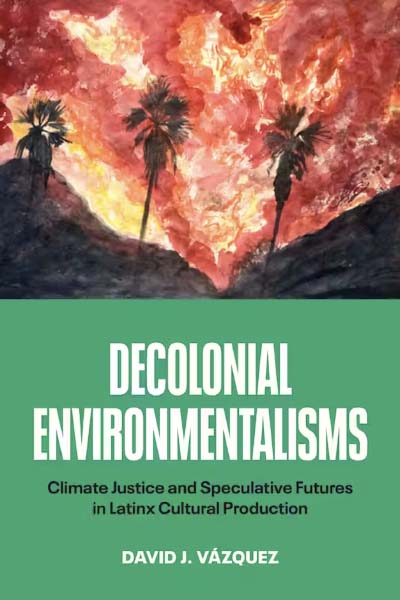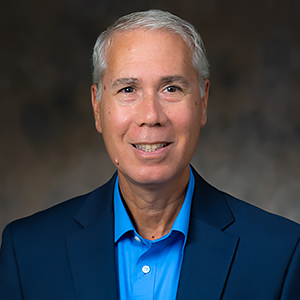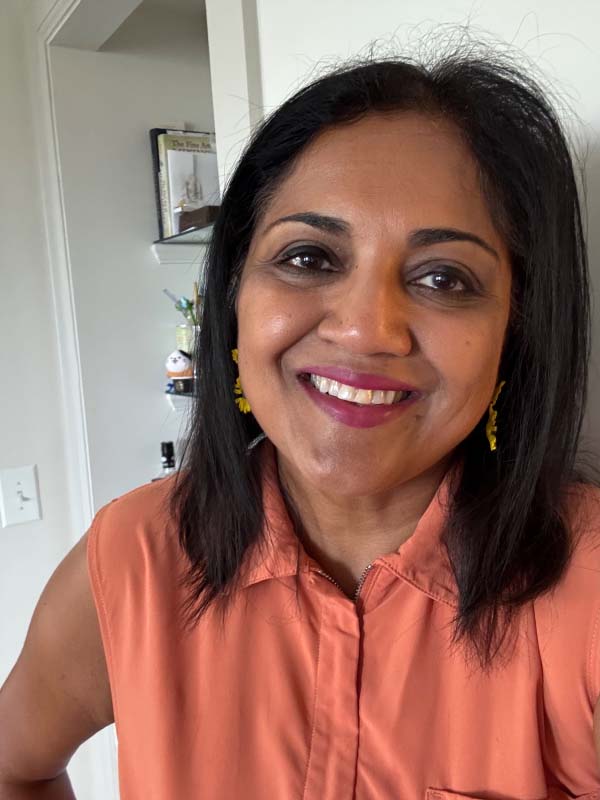A CAS Conversation with Professors David Vázquez and Anita Mannur
Two Department of Critical Race, Gender, and Culture Studies (CRGC) faculty members have been elected by their colleagues across the nation to lead their respective flagship professional associations. Professor Anita Mannur, the new director of American University’s Asia, Pacific, and Diaspora Studies program, was recently elected to be President of the Association of Asian American Studies (AAAS). Professor David Vázquez, founding director of AU’s Latina/o/x Studies program, was elected to serve as president of the Latina/o Studies Association in the coming academic year.
 It's an exciting time for Mannur and Vázquez, who also have new books published this year with leading academic presses. Mannur has published Eating More Asian America: A Food Studies Reader (New York University Press, 2025), co-edited with Robert Ji-Song Ku and Martin F. Manalansan. It was described by Krishnendu Ray, author of The Ethnic Restaurateur, as "Another spectacular collection of pungent critique, delivered with great style!"
It's an exciting time for Mannur and Vázquez, who also have new books published this year with leading academic presses. Mannur has published Eating More Asian America: A Food Studies Reader (New York University Press, 2025), co-edited with Robert Ji-Song Ku and Martin F. Manalansan. It was described by Krishnendu Ray, author of The Ethnic Restaurateur, as "Another spectacular collection of pungent critique, delivered with great style!"
 Vázquez has published Decolonial Environmentalisms: Climate Justice and Speculative Futures in Latinx Cultural Production (University of Texas Press, 2025). The book has been hailed as “truly exceptional” by Richard T. Rodríguez, University of California, who noted that it “will in no time take its rightful place as a necessary text in Latinx literary and cultural studies...Vázquez’s vibrant book is activist scholarship at its best.”
Vázquez has published Decolonial Environmentalisms: Climate Justice and Speculative Futures in Latinx Cultural Production (University of Texas Press, 2025). The book has been hailed as “truly exceptional” by Richard T. Rodríguez, University of California, who noted that it “will in no time take its rightful place as a necessary text in Latinx literary and cultural studies...Vázquez’s vibrant book is activist scholarship at its best.”
We sat down with Professors Mannur and Vázquez to discuss their new books and national leadership roles—and to hear how these achievements are shaping their research and teaching at the College of Arts and Sciences.
What does this recognition mean to you personally and professionally?
Vázquez: It’s a labor of love. Although the Latina/o Studies Organization has only been around for a little more than a decade, I have benefitted tremendously from the mentorship and support I have received from the organization and its members. I have long wanted to give back to an organization that I think of as my “home base” in the field.
Mannur: For me, AAAS is an intellectual home. This position is a way for me to give back to an association that has supported me professionally and personally. Like David, I have benefitted immeasurably from the mentorship and support I have received from the organization, and it is a privilege and an honor for me to be able to give back to the field.
What are your main goals or priorities?
 David Vázquez
David Vázquez
Vázquez: The main priority is making sure our biennial conference happens smoothly. Beyond this, we have prioritized supporting contingent faculty and graduate students with travel grants to the conference. Finally, we are hopeful that our positive financial situation will allow us to fund scholarly and mentorship awards. This, I think, is a long overdue aspect of what our national organization should do. We should recognize the important and cutting-edge work happening in the field!
Mannur: Our top priority is to ensure that our members continue to feel supported and safe in engaging with Asian American issues and advocacy—work that remains deeply important. In the face of current challenges to inclusion, organizations like AAAS play a critical role in upholding the intellectual space necessary to affirm the value of this work. My goal is to help sustain morale, encourage continued engagement, and ensure that our association is well-positioned to support contingent faculty and graduate students moving forward.
In what ways do you hope to advocate for and advance your fields during your tenure?
Vázquez: I want to continue to raise visibility for our field. We are, in many ways, on the very front lines of political struggle right now. Continuing to insist on the importance and the relevance of our field at this moment seems paramount to me.
Mannur: Our associations are deeply aligned in many ways. Advocating for the visibility of our field remains a strong priority for me—especially now. Emphasizing the pedagogical and ethical significance of our work is something I care deeply about.
You’ve both recently published new books—congratulations! How do these projects reflect the current directions or challenges in your field?
Vázquez: My new work builds on the scholarship of practitioners like Sarah D. Wald, Priscilla Solis Ybarra, María Herrera-Sobek, and others who pioneered ways of examining how Latinx authors and other cultural creators engage with questions of environmental change. My work takes this a step further by broadening the focus to comparative Latinx communities. Much of the earlier scholarship centered on Chicanxs (Mexican Americans), particularly in the US Southwest, but my work expands both the geographical and cultural scope to include many parts of the United States, the Caribbean, and creators of Dominican American, Central American American, Puerto Rican, and Peruvian American backgrounds.
My broader contention is that this comparative focus offers a richer framework for understanding how people of color engage in substantive critiques of environmental harm—critiques that are inextricably tied to their analyses of capitalism and colonialism. So, I suppose what I’d say is that my work picks up on emergent strands in the field and pushes them in new directions.
Mannur: I have long been involved in food studies, and I have published two monographs on thinking about food in Asian American and South Asian diasporas. My most recent book Eating More Asian America is a work of intellectual uplift and collaboration. At this point in my career, I am interested in creating spaces for younger scholars to publish their work and have this work acknowledged and valued. Co-creating knowledge is at the center of editing collections. Valuing new and important perspectives is also incredibly important. So, in that sense, my recent projects implicitly center the idea that knowledge is never produced in a vacuum, and I’m hoping that my work reflects this spirit.
PH: How will these positions enrich your AU classroom teaching and scholarship? What will you bring back to AU and your students?
Vázquez: I’ve already been teaching a lot of this material. For example, my LTST 350: Latinx Environmentalisms course considers a wide range of material that I include in the book. Another course that I’ve offered multiple times, LIT 121: Latinx Sci-Fi, builds on chapter four. In addition, I’ve established relationships with creators like filmmaker Alex Rivera and authors Carmen Maria Machado and Richie Narvaez. I’ve been a part of bringing these creators to campus and having them visit with my classes. It’s been one of the highlights of my time at AU, to engage with these incredible creators and make their work visible to our AU community and the wider DC metro area.
 Anita Mannur
Anita Mannur
Mannur: In my short time at AU, I’ve created courses that think about food and race as well as fashion and race in Asian America. My APDS 351: Food and Race in Asian America, as well as an AU Honors course I’ll be teaching about immigrant foodways, draw heavily from my food studies work.
Last year I organized an event at AU that brought together writers, artists, and chefs to talk about food and race. Having these speakers interact with our students has enriched our students’ learning. Building connections among DMV Asian Americanists is top on my goals, and I am excited to use my position to help create learning opportunities outside the classroom for my students. One of the things I’m really excited about is that the 2027 AAAS conference will be in Baltimore. This will be the second time in the association’s history that the conference has been in the DMV, and I am hoping that we will be able to bring students to the conference. I really hope that I can leverage these opportunities into ways that make Asian American Studies more visible on our campus and in the DMV at large.